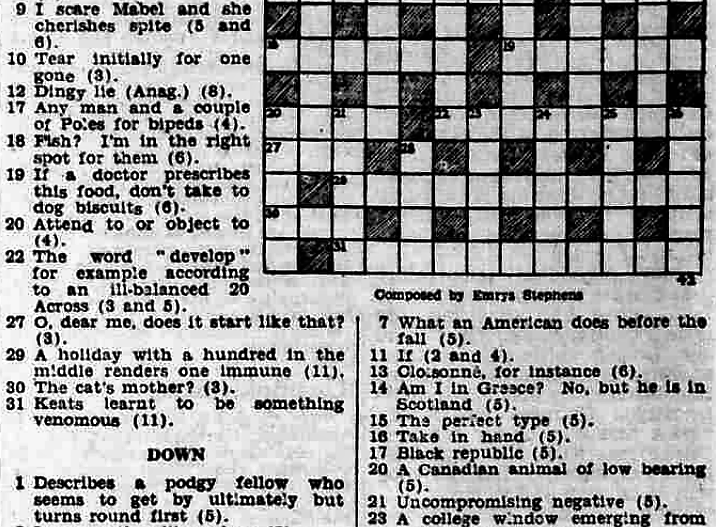
crossword in The Yorkshire Post and Leeds Mercury of 23rd January 1950
30 across: The cat’s mother? (3).
The phrase who’s ‘she’—the cat’s mother? and variants are said to a person, especially a child, who uses the feminine third person singular pronoun impolitely or with inadequate reference.
The earliest use of the phrase that I found is from The White Cat! Or, Prince Lardi-Dardi & the Radiant Rosetta. A Fairy Burlesque Extravaganza, written by the English playwright Francis Cowley Burnand (1836-1917) and first produced at the Globe Theatre, London, on 26th December 1870:
– White Cat. Here is our housekeeper.
(ancient and stately Cat walks forward down, L. C.)
– Lardi. Who’s she?
– Miss M. That’s me!
Sir, if you want to know who I may be,
Be more polite, don’t ask—who’s she.
– White Cat. Oh, bother!
– Miss M. (annoyed, crosses to R. C., and White Cat to L. C.)
His nurse would tell him, “she” is the cat’s mother;
A lesson learnt by every little baby.
But if you’d know my name, I’m Miss Mc Tabby.
A contributor to Notes and Queries of 25th May 1878 confirmed that the phrase had long been in usage:
“She, the cat’s mother.”—I cannot find any mention of this saying in the General Indexes of “N. & Q.” or in books of proverbial expressions, but it is one with which I have been acquainted from my youth, and which I still hear from time to time. For example, a little girl runs in to her mother, and says excitedly, “O mamma, we met her just as we were coming home from our walk, and she was so glad to see us!” Upon which the mamma says, “Who is ‘she’? the cat’s mother?” Then the child laughs merrily, and replies, “No; it was Lucy Jones.” “But how could I know that, when you did not mention her name?” Thus, “She, the cat’s mother,” is used to enjoin perspicuity of speech and precision of reference.
Cuthbert Bede.
F. Northall recorded a variant with a different meaning in Folk-Phrases of Four Counties (Gloucestershire, Staffordshire, Warwickshire, Worcestershire)(1894):
Her’s the cat’s mother. Warwickshire. Said to one who uses the possessive ‘her’ of the third person instead of the nominative ‘she.’
A review of this book published in The Glasgow Herald of 21st March 1895 had:
Mr Northall quotes “her’s the cat’s mother” as being “said to one who uses the possessive ‘her’ of the third person instead of the nominative ‘she.’” This may be the case in Warwickshire, as here indicated. In other parts it is used—either with “her” or “she”—to rebuke children who disrespectfully use the pronoun of an elder person instead of giving her her name.
In the following passage from The Beth Book. Being a Study from the Life of Elizabeth Caldwell Maclure, a Woman of Genius (1897), a semi-autobiographical novel by the Irish feminist author Sarah Grand (1854-1943), Beth is talking with Aunt Victoria:
“I once did a piece of unpicking like this for mamma, and she didn’t explain properly, or something—at all events, I took out a great deal too much, so she——”
“Don’t call your mamma ‘she.’ ‘She’ is the cat.”
“Mamma, then. Mamma beat me.”
“Don’t say she beat you.”
“I said mamma.”
“Well, don’t talk about your mamma beating you. That is not a nice thing to talk about.”
“It’s not a nice thing to do either,” said Beth judicially.
